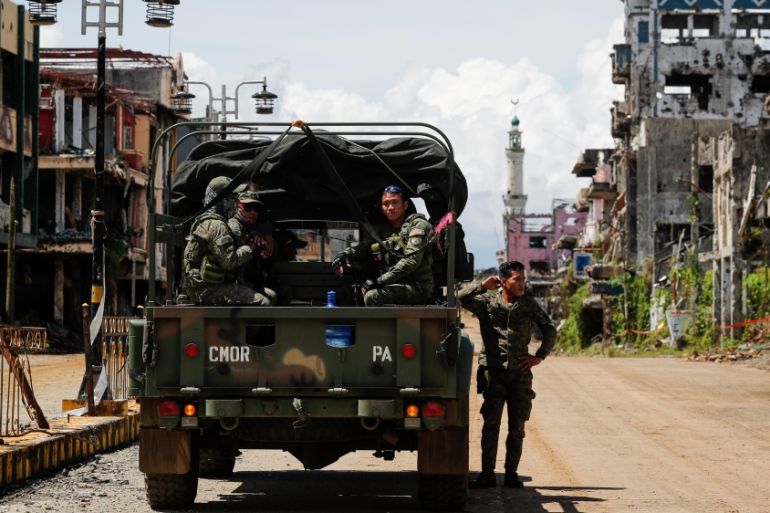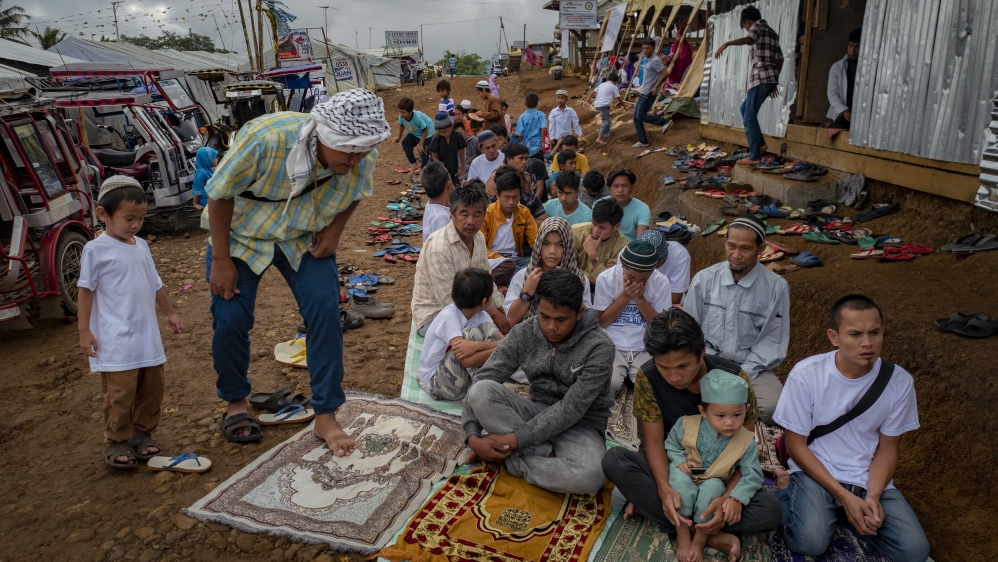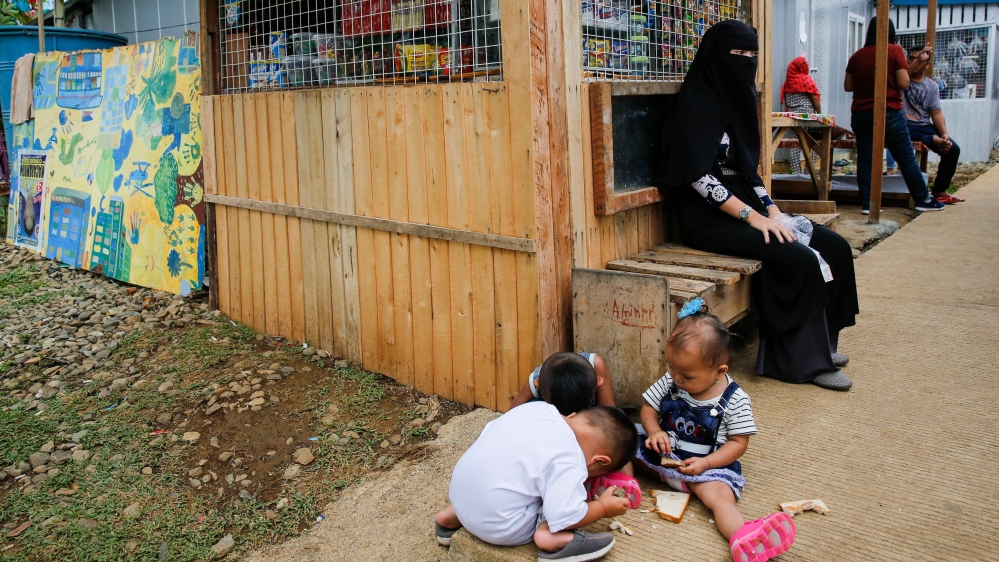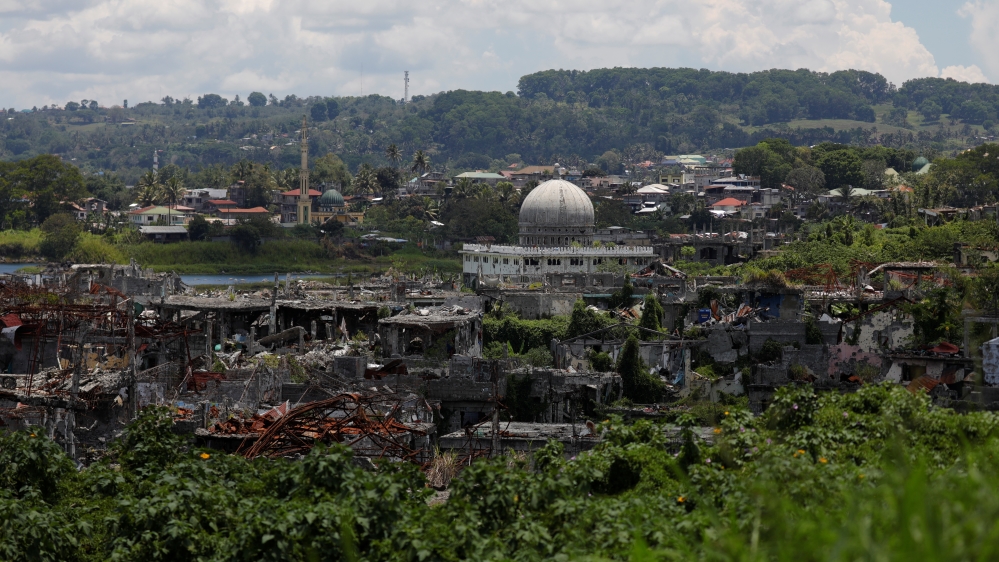Delay in return ‘boosts ISIL recruitment’ in Philippines’ Marawi
More than 100,000 people, half the southern city’s population, still unable to return two years after siege ended.

On October 23, 2017, the Philippine army declared the end of the bloody five-month-long siege in the southern city of Marawi, punctuating the battle with the killing of 42 suspected armed fighters affiliated with the Islamic State of Iraq and the Levant (ISIL, or ISIS).
The country’s most sustained active combat since World War II killed at least 925 fighters from the ISIL-linked Maute and Abu Sayyaf groups, 165 government troops and a conservative estimate of 45 civilians. It also flattened a bustling city, forced hundreds of thousands to evacuate and left the entire island of Mindanao under martial law.
Keep reading
list of 4 itemsPhilippine human rights campaigner granted bail
Families urge Philippines to work with ICC on ‘drug war’ probe
Philippine police officer jailed for killing teens in ‘drug war’
But two years after President Rodrigo Duterte declared the city “liberated from the terrorist influence”, opposition politicians and Marawi residents say the promised rehabilitation has failed, and Mindanao experts are warning that these delays are providing “fertile ground” for ongoing recruitment by “extremists”, as they try to show that the ISIL ideology is well and alive in the Philippines.
|
|
Vice President Leni Robredo, the opposition leader, said “very little has been achieved” since the day the government promised to restore the city to its former glory.
“Two years on and the displaced locals are still lamenting the pace of the rehabilitation, as well as the government’s failure to involve them in the planning,” Robredo said in a statement to Al Jazeera on Tuesday.
She also pointed out that the delays in the rebuilding and resettlement of residents had been further stalled by the involvement of Chinese-led firms “blacklisted by the World Bank for questionable dealings”.
As of October 2019, more than 100,000 people, or half of Marawi’s population, were still in temporary government-built shelters unable to return to their homes in “ground zero”, where most of the fighting took place. Most of the evacuees are from the Muslim Maranao tribe.
“Two years is already long enough for the administration to polish its rehabilitation plan for the city,” Robredo said. “Should we wait for another three years before the Maranaos go back to their normal lives?”
‘Winging it’
On Tuesday, Housing Secretary Eduardo del Rosario told reporters in Marawi that the rehabilitation was “on track with our timetable“.
Del Rosario, who is in charge of the rehabilitation, said debris clearing operation in the areas, where the fighting and government bombardments took place, will be completed by the end of November.
But he did not set a date when the residents would be allowed to reconstruct their homes, only saying “the reconstruction of all vertical projects, government infrastructures will commence in November or December this year and onward.”

According to estimates, the government needs more than a billion dollars to rehabilitate Marawi. As of June 2019, the government has distributed $1,400 cash assistance to 15,000 households, according to rehabilitation field manager, Felix Castro.
Former Senator Antonio Trillanes, a retired military officer and critic of Duterte, said the “human tragedy and disaster” Marawi residents are currently facing continues because the government is “winging it” when it comes to rehabilitation.
“They have totally underestimated the extent of the rehabilitation operation needed to rebuild Marawi,” he said.
As Marawi City commemorates the second year since President Rodrigo Duterte declared its liberation from the extremist group Maute, #TheGlimpses on The GUIDON looks into the residents’ various efforts to rebuild their beloved city.https://t.co/ehf9wIFXlH pic.twitter.com/FYdTQQvaEt
— The GUIDON (@TheGUIDON) October 21, 2019
‘Pain and suffering’
Marawi community leader Drieza Abato Lininding told Al Jazeera that the government had already missed several of its promised deadlines, and that not a single family had been allowed back.
Two years after the end of the siege “there is nothing to commemorate, only pain and our suffering continue until today. We do not feel liberated at all.”
He said displaced residents were also angry about Marawi City Mayor Majul Gandamra’s decision to allow the national government to demolish homes without the consent of their owners.
“This was kept secret until last week when the private contractor was forced to show [the document] after the residents complained,” he told Al Jazeera, adding, that many of those who were affected could not do anything, because the demolition had already taken place.
“They are not even following the due process and the law, but then they all want us to follow the law by the letter, no more, no less.”
Al Jazeera contacted the office of Mayor Gandamra but had not received a response at the time of publication.
Previously, residents have also expressed anger that Duterte ordered the construction of a new military base at the heart of the city, before the rehabilitation. There were 12,000 troops deployed to the city at the height of the fighting.
Salma Pir Rasul, law professor and director of the Islamic Law Studies at the University of the Philippines in Manila, told Al Jazeera that the government cannot justify keeping the Maranaos from their homes for two years.
“Maranaos are essentially traders. If you remove them from the place, where they sell goods, there is a negative impact on their ability to support their families,” Rasul told Al Jazeera.
“If you have been to Marawi before the siege, and you go now, you will be really heartbroken.”
Financial enticement
Rasul warned that “anti-government sentiment is high” among the displaced Maranao, and “all of those” interviewed by her organisation confirmed that there was ongoing recruitment by “extremist groups” even inside the refugee camps.

The “narrative” employed by the recruiters to convince young people to fight is as simple as pointing out their current condition, Rasul said.
“They will just say, ‘Look what is happening to you. The government is not helping. In fact, they destroyed your homes, they are destroying your livelihood.'”
“The longer that this is not resolved and they are not allowed to go back, the higher the probability that they will believe in this narrative, false as it may be,” Rasul added.
|
|
Rasul said that some of the young people she interviewed “see no option”, and that the financial offer to fight is appealing.
A sign-up bonus could be between 20,000 to 50,000 pesos ($390 to $1,000) plus a monthly allowance – a significant monetary enticement for an impoverished family in Mindanao, Rasul said.
Many of the young Maranaos also said that they had been promised that whatever happens to them, their family would continue to receive compensation.
“For them, that’s showing that they are being a good son, proving their self-worth that they are doing something to help the family,” Rasul said.
She said some young people at local universities are also being recruited, using the more “sophisticated” political persuasion about the plight and injustice against Maranaos.
Rebekah M Alawi, a professor on cultural studies and literature at Mindanao State University’s main campus in Marawi, has also conducted interviews among the Maranaos after the siege.
She told Al Jazeera that recruitment is ongoing, not only in Marawi but also in nearby towns surrounding Lake Lanao.

She appealed to the government to provide help in rehabilitating ISIL-linked child fighters before they could be enticed anew to go into another armed struggle.
“They are among us. They were really child warriors, recruits, whether they fought during the Marawi siege, or just recruited. We still have to save them.”
She said that “she has faith” in the administration of President Duterte to deliver on his promise.
As for former Senator Trillanes, he said that while he has not received information about recruitment, he “would not be surprised” if it is happening given the lack of post-conflict planning.
“There is fertile ground for recruitment,” he said, while adding that “there is no excuse for the delay” in the government’s plan to rebuild Marawi.
|
|